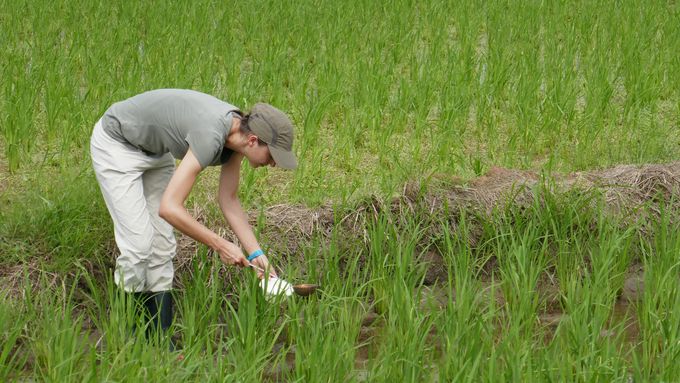Multi-Insecticide Resistant Malaria Vectors Remain Susceptible to Malathion Insecticide
11.02.2022
Insecticide resistant mosquitoes are a growing concern in malaria control. A study conducted by Swiss TPH and partners raises hope that multi-resistant malaria vectors remain largely susceptible to the insecticide malathion. By studying field mosquito populations in Côte d’Ivoire, the authors found that genes which cause resistance to the widely used pyrethroid insecticides likely increase susceptibility to malathion. This phenomenon could be exploited as a targeted tool for malaria control. The findings were published yesterday in the peer-reviewed journal PLOS Genetics.

Nadja Wipf and her team tested insecticide resistance of mosquito populations from the field and measured gene expression profiles from individual mosquitoes. Here, Wipf is collecting Anopheles mosquito larvae from a rice field in Tiassalé, Côte d’Ivoire. (Photo: Pie Müller, Swiss TPH)
Despite ongoing efforts in malaria control, the progress of malaria prevention has remained stagnant over the past seven years. The World Health Organization estimates a rise in malaria cases from 227 million in 2019 to 241 million in 2020. While the COVID-19 pandemic has played a major role in recent years, progress in malaria control was already stalling; with one reason being the increase in insecticide resistance.
The main tools in fighting malaria and other vector-borne diseases are insecticide-treated bed nets and indoor residual spraying. The extensive use of insecticides in vector control and in agriculture puts malaria vectors under selection pressure, resulting in the emergence and spread of insecticide resistant mosquitoes, which in turn undermines common control measures.
Understanding resistance mechanisms in field populations
There are multiple ways of how malaria vectors build resistance against insecticides. It is known that certain enzymes and mutations at the insecticides’ target sites, where the insecticide is active, regulate insecticide resistance. Thus, studying molecular resistance mechanisms can contribute to understanding these processes.
A new study conducted by Swiss TPH and partners tested three mosquito field populations from Côte d’Ivoire for resistance against four widely used insecticides. All populations were resistant to three of them, including deltamethrin from the class of pyrethroid insecticides that is used on all long-lasting insecticidal bed nets. Against expectations, they were still susceptible to malathion, a representative insecticide of the organophosphates. “These results were surprising because the mosquitoes carried a point mutation at the target site of malathion that usually confers resistance to this insecticide,” said Nadja Wipf, medical entomologist and first author of the article that was published yesterday in the peer-reviewed journal PLOS Genetics.
A reason for these results could be so called negative cross-resistance. “One enzyme has two effects: on the one hand, it degrades the agent deltamethrin to less toxic substances leading to reduced susceptibility. On the other hand, it transforms malathion into a more toxic form leading to increased susceptibility,” explained Wipf. “While measuring the gene expression profiles of individual mosquitoes, we found numerous enzymes overexpressed in the Ivorian field populations – including some that have recently been associated with negative cross-resistance in lab studies,” she added.
Use of negative cross-resistance as targeted tool
Current malaria control measures are becoming less effective due to insecticide resistance. Even though research for new insecticides and methods are under way, it may take years until they can be implemented. “Our study contributes to a better understanding of negative cross-resistance and how it could be used for targeted insect control. By taking advantage of negative cross-resistance, classic malaria control measures and conventional insecticides may be used purposefully until new interventions are in place,” said Wipf.
Pie Müller, Head of the Vector Biology Unit at Swiss TPH and last author of the publication added: “It is key to maintain the effectiveness of current interventions by delaying and managing insecticide resistance while developing new control tools. Surveillance of insecticide resistance and understanding its mechanisms are fundamental for guiding disease control and insecticide resistance management strategies.”
About the study
The study was conducted by the Swiss Tropical and Public Health Institute (Swiss TPH) in collaboration with the Centre Suisse de Recherches Scientifiques en Côte d'Ivoire (CSRS) and Diagnosis Management Communication - Malaria Vector Control (DMC-MALVEC). The research was funded by the European Research Council (ERC) and the Novartis Foundation for Medical-Biological Research.
Wipf, N. C. et al. (2022). Multi-insecticide resistant malaria vectors in the field remain susceptible to malathion, despite the presence of Ace1 point mutations. PLOS Genetics. https://doi.org/10.1371/journal.pgen.1009963
Contact

Pie Müller
PD, PhD
Head of Unit
+41612848241
pie.mueller@swisstph.ch
Stay connected
Subscribe to our newsletter and get all the latest research news, project updates, course and event listings from Swiss TPH.